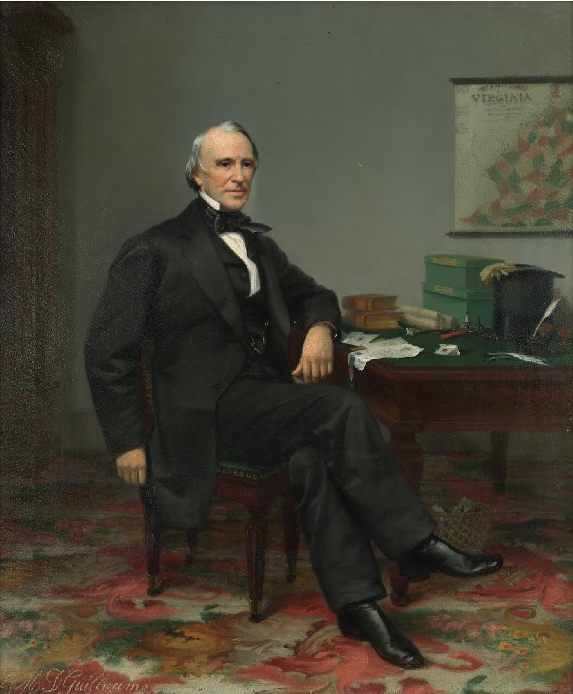Wyndham Robertson
| Wyndham Robertson | |
|---|---|

Portrait of Wyndham Robertson ca. 1880 by L.M.D. Guillaume
|
|
| Acting Governor of Virginia | |
|
In office 1836–1837 |
|
| Preceded by |
Littleton Waller Tazewell as Governor |
| Succeeded by |
David Campbell as Governor |
| Virginia House of Delegates | |
|
In office 1838–1841 |
|
| Constituency | Richmond, Virginia |
| Virginia House of Delegates | |
|
In office 1859–1865 |
|
| Constituency | Richmond, Virginia |
| Personal details | |
| Born |
January 26, 1803 near Manchester, Chesterfield County, Virginia |
| Died | February 11, 1888 (aged 85) Abingdon, Virginia |
| Political party | Whig |
| Spouse(s) | Mary Trigg Smith |
| Residence |
Richmond, Virginia Abingdon, Virginia |
Wyndham Robertson (January 26, 1803 – February 11, 1888) was the Acting Governor of the U.S. state of Virginia from 1836 to 1837. He also served twice in the Virginia House of Delegates, the second time during the American Civil War.
Robertson was a Whig, and was an advocate for Union during the secession crisis that precipitated the Civil War. However, after Lincoln's call for troops, he advocated secession. After the war, he was a member of the Committee of Nine that helped usher Virginia back into the Union. Robertson, a descendant of Pocahontas, published a book near the end of his life in her defense, and tracing her ancestry and descendants.
Robertson was born near Manchester, in Chesterfield County, Virginia, the son of William Robertson and Elizabeth Bolling, a descendant of Pocahontas and John Rolfe. His father was a member of the Virginia Council of State. Robertson attended private schools in Richmond and graduated from The College of William and Mary in 1821. He then married Mary Trigg Smith, daughter of Captain Francis Smith. Robertson's brothers were Thomas B. Robertson, a Governor of Louisiana, and John Robertson, a U.S. Congressman. Robertson studied law and was admitted to the bar in 1824. In 1827, he made a short trip to Paris and London, and in 1830 he was made Councillor of State.
Robertson was re-elected to the Council of State in 1833, and on March 31, 1836, he became the senior member of this body, and therefore Lieutenant-Governor of Virginia. When Governor Littleton Waller Tazewell resigned that same day, Robertson became Governor. Since the Virginia Legislature, which elected the Governor, was Democratic, and he, being a Whig, was not, Robertson was not elected when his term was up in 1837, and he was replaced by David Campbell. Robertson was then elected to the Virginia House of Delegates for the 1838 session. He was re-elected for three successive sessions, ending his service in 1841.
...
Wikipedia
